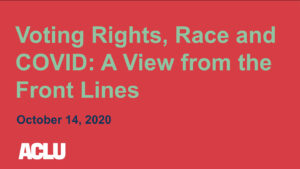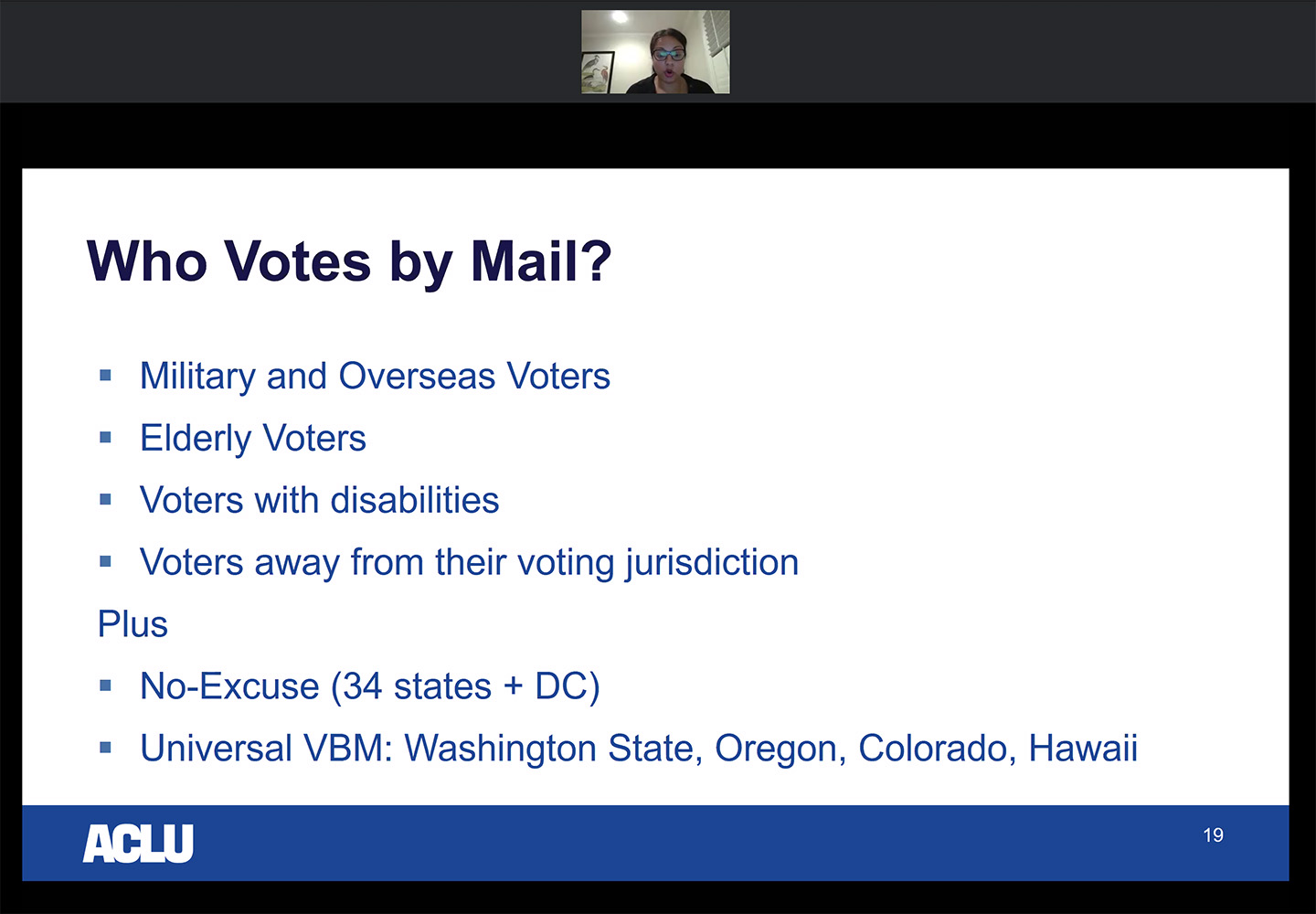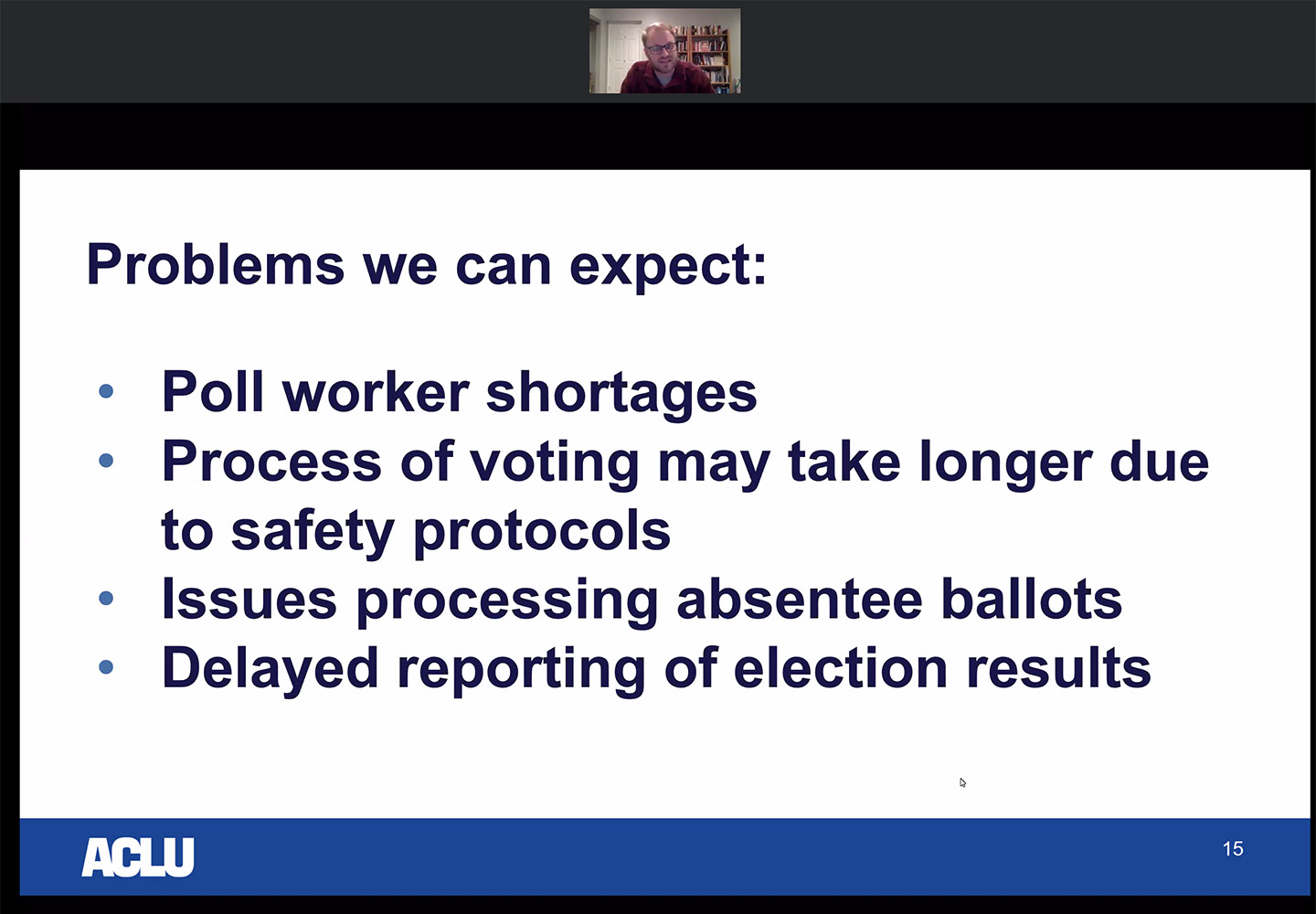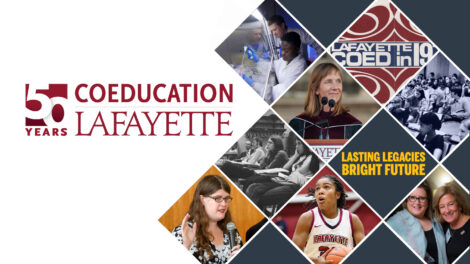WGSS-sponsored lecture celebrates the centenary of women’s voting and illuminates how access to the vote remains fraught
By Katie Neitz
It’s been 100 years since the ratification of the 19th amendment, which granted women the right to vote. Despite that victory and progress made since, the fight for equal access to the ballot continues, particularly for people of color.
COVID-19 has only further intensified the battle. The pandemic has amplified racial inequalities, complicated voting logistics, and agitated an already contentious political environment.
Altogether, these factors make for a high stakes presidential election—and a compelling lecture topic.
On Oct. 14, members of the Lafayette community gathered virtually to hear American Civil Liberties Union (ACLU) attorneys discuss these matters. Their presentation, “Voting Rights, Race and COVID: A View from the Front Lines,” was sponsored by the College’s women’s, gender, and sexuality studies (WGSS) program.
Mary Armstrong, Charles A. Dana Professor of Women’s, Gender, and Sexuality Studies and English, provided opening remarks, expressing that the goal of the event was to both celebrate the centenary of women’s voting in the United States and illuminate how access to the vote remains deeply fraught in our democracy.
Armstrong shared that WGSS started planning the event a year ago—before COVID-19 was a household term. The pandemic made the conversation all the more relevant.
Sonia Gill, senior legislative counsel in the National Policy Advocacy Department of the ACLU, and Bobby Hoffman, deputy director of the ACLU Democracy Division, led the conversation, which was followed by an interactive Q&A.
During their talk, Gill and Hoffman shared the history of voting rights in the United States, the impact COVID is having on the current election cycle, attacks on election legitimacy, and instructions on how to vote and ensure your voice is heard.
Here are four takeaways from the talk:
Voting by mail is safe.
“There have been alarms raised about voter fraud by mail. You should know that voter fraud is extremely rare. Mail-based voting fraud is extremely rare,” Gill said. “In fact, it’s statistically more likely that you’ll get struck by lightning or there will be a Big Foot sighting than there is of someone committing voter fraud. It is safe and secure and a reliable process to cast a ballot. There are a lot of procedural safeguards in place to ensure your ballot is protected from interference.
“Voting by mail is a very popular option, especially during a pandemic because it mitigates risk by eliminating person to person contact. Voting by mail first became popularized during the Civil War when Union soldiers used mail to cast their ballots in the presidential election of 1860. It’s been historically used by our military for over 100 years. It has been used historically by elderly voters and those who are away from their voting jurisdictions during an election. Today, voting is a highly sophisticated system. There are states—Washington, Oregon, Colorado, and Hawaii— that conduct their elections entirely by mail.”

Know your rights.
“Voter intimidation has been in the news, but hopefully it’s not something we will see much of on Election Day, but certainly it might be something people are thinking about as they go to cast a ballot,” Hoffman said. “I want to reassure folks that it is illegal to intimidate voters, and it is a federal crime. Some examples of voter intimidation include:
- aggressively questioning voters about their citizenship, criminal records, or other qualifications to vote as they attempt to cast a ballot
- falsely representing oneself as an election official
- displaying false or misleading signs about voter fraud or related criminal penalties
- harassing voters, particularly targeting non-English speakers or voters of color
- spreading of false information about voter requirements or the voting process.”
If you do spot or have any issues with voter intimidation, Hoffman provided these resources:
- ACLU.org/voter
- VotesPA.com
- 866-OUR-VOTE
This November, be patient.
“The most important thing we can do after Election Day is be patient, especially in Pennsylvania and Wisconsin; those two states are going to be pivotal battlegrounds,” Hoffman said. “They don’t start processing absentee ballots until the day of the election. Given the large amount of mail- in and absentee ballots that are going to be occurring, I think we need to be really cognizant of that fact and be aware that it could be days or even weeks waiting for the official election results to be given.”

Get involved!
- Participate: “Start to think about participating in your jurisdiction’s elections administration,” Gill said. “Go to meetings of the board of elections or the county council or whoever makes decisions on how people vote. Become a poll worker, a permanent one. We are going into a redistricting cycle because of the census; you should participate in that process. That is something you should absolutely be focusing on. We need to make sure there are fair maps that represent people fairly.”
- Educate: “You can also educate your friends and family. It sounds kind of hokey, but that’s huge. I have not seen in my whole career the level of voter information that we are seeing now in every facet of our lives. It has been amazing. Don’t look past the value of educating the people around you what their rights are.”
Interested in learning more? Watch the entire lecture.




